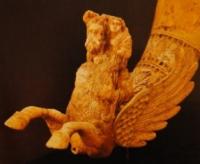Вы здесь
Khudaynazar Ovliy mausoleum.

Tourist travel across Turkmenistan.
«Instead of the sun all world to light up - I can not,
In secret real a door to open - I can not.
I have found In the sea of ideas a pearl of sense,
But for its fear I can not drill»
Omar Khayam.
Excursion tourism across Turkmenistan.
Khudaynazar Ovliy the mausoleum is in 25 kilometers to the north of an ancient site of ancient settlement the Sultan kala. The mausoleum is dated the first quarter of XII century Khudaynazar Ovliy concerns to a category without portal the center the mausoleums Seldjuks time which basis of a decor is made with impressive qualities a brick.
Mohammed's mausoleum ibn Zeyada in Merv is close to him. The best and blossoming city of Khurasan has stopped the existence in 1221 as a result of its full rout and destruction of all population by the Mongolian hordes.
In 1450th years Merv great-grandson Timur Mirza Sandzhar operated, he has built up new city which ruins now are known under the name Khan kala - named Turkmen the governor, short time owned Merv. Period Timurids is embodied not only in a fortification Abdulla khan kala, but also in a monumental construction in southern part Iskander kala in the form of two arch aiyvans and esteemed tombs the prophet. Merv was never a mere staging post for caravans and nomads. It always belonged to settled empires and its most ancient ties are with Iran to the south-west rather than with Transoxiana or the Turkmen tribes. For five centuries, from the decline of the Seleucids in the II century B.C. until the rise of the Iranian Sassanids in the mid III century A.D., Merv was part of the Parthian empire.
Then it became a north-eastern outpost of the Sassanian one and enjoyed an era of religious tolerance, with Budhists, Zoroastrians and Neoastrian Christians cohabiting peacefully. As Baghdad’s power waned Merv’s waxed.
In 1037 she switched her allegiance from the Caliphs to the Seljuk Turks and became the adopted capital of their great viceroy Sultan Sanjar, who shifted the city westwards and gave it new defenses and a giant mausoleum in his own memory.
The Seljuk empire stretched from the Aral to the Mediterranean and controlled most of the western Silk Route. By the end of the XII century Merv had never been richer nor more populous; the oasis as a whole supported more than a million people.
And yet Armageddon was nigh.
Authority:
Bernshtam A.N. «History-archeologic sketches Central Tien-Shan and Pamir-Alay». «Religious and spiritual monuments of the Central Asia». The author of M. Khashimov. Publishing house "Saga", 2001 Tolstov S.P. «Ancient Khoresm», 1848. Tolstov S.P. «On traces Ancient Khorezm civilizations», М.-L., 1948.







